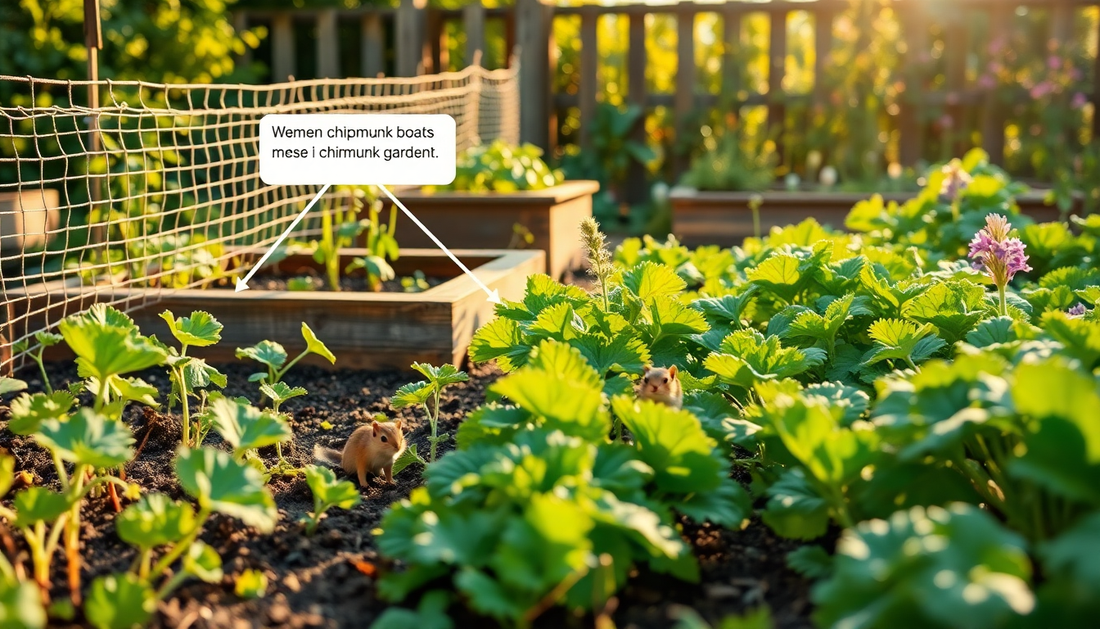
How to Stop Chipmunks from Digging Up Your Vegetables
As a passionate gardener, there's nothing more frustrating than seeing your carefully tended vegetable beds ravaged by pesky chipmunks. These adorable yet mischievous creatures can wreak havoc on your hard work, burrowing through the soil and feasting on your precious crops. But fear not, fellow gardeners! In this comprehensive guide, we'll explore effective strategies to deter chipmunks and protect your vegetable garden.
Understanding Chipmunk Behavior
Chipmunks are small, ground-dwelling squirrels known for their distinctive striped appearance and boundless energy. These industrious creatures are natural foragers, driven by an innate instinct to gather and store food for the winter months. Unfortunately, this behavior often leads them straight to our vegetable gardens, where they find a veritable buffet of tasty treats.
Chipmunks are particularly attracted to soft, freshly turned soil, making vegetable beds an irresistible target. They burrow through the earth, creating intricate tunnel systems and caching their findings in various hiding spots. This not only damages your plants but can also compromise the structural integrity of your garden beds.
Deterring Chipmunks Naturally
The first step in protecting your garden is to understand that chipmunks are a natural part of the ecosystem. Rather than resorting to harsh, chemical-based solutions, it's best to explore eco-friendly, humane methods that discourage their presence without harming them.
Use Repellents
One effective natural deterrent is the use of repellents. Chipmunks have a strong sense of smell, and certain scents can be used to keep them at bay. Consider sprinkling cayenne pepper, garlic powder, or a commercial repellent made from natural ingredients around the perimeter of your garden beds. Reapply after rain or watering to maintain the scent barrier.
Install Physical Barriers
Another approach is to create physical barriers that prevent chipmunks from accessing your vegetable beds. Bury hardware cloth or chicken wire a few inches into the soil around the perimeter of your garden, ensuring that the mesh extends at least 12 inches above the ground. This creates an effective deterrent that chipmunks can't burrow under or climb over.
Encourage Natural Predators
Embracing the natural predators of chipmunks can also be a valuable strategy. Encourage the presence of hawks, owls, snakes, and other predators by providing suitable habitats, such as dense shrubs or birdhouses. These natural deterrents can help keep the chipmunk population in check without the need for harmful interventions.
Disrupt Foraging Patterns
Chipmunks are creatures of habit, and disrupting their foraging patterns can discourage them from returning to your garden. Regularly raking or cultivating the soil can make it less appealing for burrowing and caching food. Additionally, consider placing large rocks or decorative stones in areas where you've noticed chipmunk activity, as they prefer to avoid open, exposed spaces.
Protecting Your Vegetable Beds
While deterring chipmunks is essential, it's equally important to safeguard your vegetable beds to minimize the impact of any potential intrusions.
Use Raised Beds
Constructing raised garden beds can be an effective way to deter chipmunks. The elevated structure makes it more challenging for them to access the soil and your plants. Additionally, you can line the bottom of the raised beds with hardware cloth or chicken wire to create an additional barrier.
Cover Crops and Mulch
Covering your vegetable beds with a thick layer of mulch or a cover crop can help conceal the soil and make it less inviting for chipmunks to burrow. Opt for materials like wood chips, leaves, or straw, which not only deter burrowing but also help retain moisture and suppress weed growth.
Companion Planting
Certain plants can act as natural deterrents for chipmunks. Consider incorporating strong-smelling herbs like lavender, mint, or marigolds around the perimeter of your vegetable beds. The pungent aromas can help mask the scent of your crops and make the area less appealing to these furry intruders.
Persistent and Patience
Protecting your vegetable garden from chipmunks requires a multi-faceted approach and a good dose of patience. It's important to remember that these strategies may not provide immediate results, as chipmunks are adaptable and persistent. Consistency is key, so be prepared to reapply repellents, maintain physical barriers, and monitor your garden regularly.
Remember, coexisting with nature is an integral part of gardening. By understanding chipmunk behavior and employing a range of humane deterrents, you can find a balance that allows your vegetable garden to thrive while respecting the delicate balance of the ecosystem. Happy gardening!






No comments